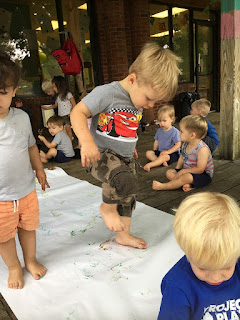Project Art
Why is art important in early education?
1. In addition to helping youth develop important skills, free expression is also good for overall health and well-being. Giving your child a creative outlet can help relieve stress and work through things happening in their lives. By encouraging artistic expression, you can help facilitate learning.
- Fine motor skills. Grasping pencils, crayons, chalk, and paintbrushes helps children develop their fine motor muscles. This development will help your child with writing, buttoning a coat and other tasks that require controlled movements.
- Cognitive development. Art can help children learn and practice skills like patterning and cause and effect (“If I push very hard with a crayon the color is darker.”). They can also practice critical thinking skills by making a mental plan or picture of what they intend to create and following through on their plan.
- Math skills. Children can learn, create and begin to understand concepts like size, shape, making comparisons, counting, and spatial reasoning.
- Language skills. As children describe and share their artwork, as well as their process, they develop language skills. You can encourage this development by actively listening and asking open-ended questions in return. It is also a great opportunity to learn new vocabulary words regarding their project (texture).













